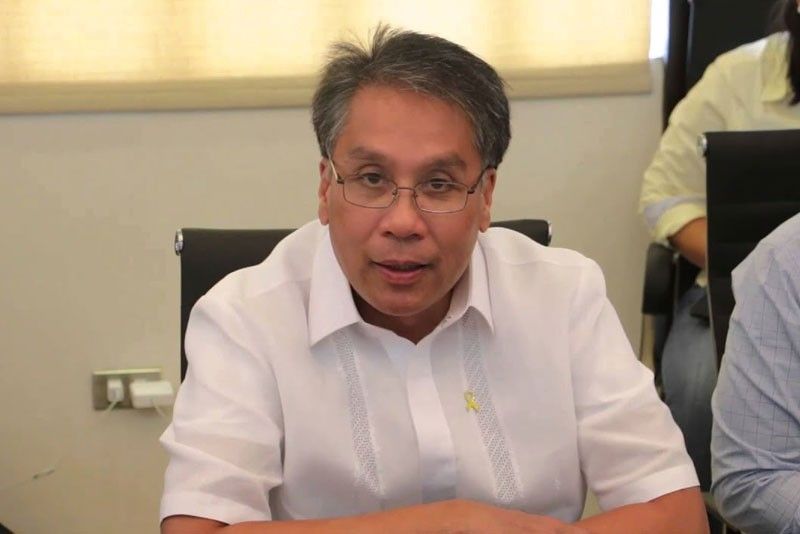Mar Roxas defends IRR of GCTA law

MANILA, Philippines — Former interior secretary Mar Roxas has defended the implementing rules and regulations (IRR) of the controversial Good Conduct Time Allowance (GCTA) law, which supposedly paved way for the early release of prisoners convicted of heinous crimes.
In his four-page letter submitted to the Office of the Ombudsman, he maintained that the IRR, which the Department of the Interior and Local Government (DILG) co-drafted with the Department of Justice (DOJ), “faithfully reflects” the provisions of Republic Act 10592 or the GCTA law.
The ombudsman, which is conducting a separate probe on the release of more than 1,900 heinous crimes convicts, had directed Roxas and detained Sen. Leila de Lima, who was justice secretary when the IRR was made, to explain why the law’s IRR does not contain provisions on the disqualification of inmates from coverage as enumerated in Article 29 of the Revised Penal Code (RPC) and Section 1 of RA 10592.
Both the law, which amended the RPC to allow shortened prison terms for convicts by crediting the period of their preventive imprisonment in the counting of the number of years of sentence, and its IRR were approved during the Aquino administration.
In his letter, Roxas maintained that Rule IV, Section 3 of the IRR “fully captures the classes of accused persons who are disqualified from having the period of their preventive imprisonment deducted from their actual prison terms found in the first paragraph of Article 29 (of the RPC).”
He provided a side-by-side comparison of the exact wording of Rule IV Section 3 of the IRR and Article 29 of the RPC to show that they both state that the credit for preventive imprisonment shall not apply to a person considered a recidivist, has been convicted previously twice or more of any crime and who failed to surrender voluntarily upon being summoned for the execution of his sentence.
“This being the case... allegations that the IRR has strayed from the law on which it is based are unquestionably unfounded,” Roxas said.
Aside from the specific enumeration, he added that Rule IV, Section 1 of the IRR generally states that an accused can only have the term of his preventive imprisonment credited in the service of his sentence “provided one is not disqualified under Article 29 of the Revised Penal Code.”
“Hence, all the pertinent disqualifications found in Article 29 are incorporated into the IRR... Under no circumstance can any omission in said section be said to be the cause of the issues facing BuCor (Bureau of Corrections) today,” he stressed.
He added that Rule IV, Section 6 of the IRR also laid out the grounds for total disqualification of inmates for provisional release even if they already served a preventive imprisonment period equal to or longer than the maximum imposable sentence for the offense they are charged with.
The former interior secretary maintained that the IRR faithfully complied with the last paragraph of Article 29 of the RPC which states that prisoners who are recidivists, habitual delinquents, escapees and charged with heinous crimes are totally disqualified from provisional release from jail.
“All four disqualifications were included in the rules, and none of them are missing as alleged by many commentators in recent days. They are there for everyone to see and for the concerned officers of government to observe,” Roxas said.
He also said that “concerns regarding what is and what is not found in both the IRR and RA 10592, as well as questions on the continued wisdom and soundness of the provisions thereof in light of recent developments, are matters of policy best left to the sound discretion of the executive departments concerned and, perhaps, of Congress itself.”
Roxas also turned the tables on former Senate president Juan Ponce Enrile, who said he and De Lima should be disqualified forever from holding public office for the whole mess in the implementation of the GCTA law.
In a tweet, Roxas said people who are facing plunder should be the ones barred from holding public office.
“Ahem. Yung dapat (The one that should be) barred from public service at makulong, yung may kaso ng (and jailed is the one charged for) plunder,” he posted together with Enrile’s picture in his Twitter account.
Enrile has pending plunder charges in connection with the Priority Development Assistance Fund scam where he allegedly pocketed P172.8 million in kickbacks. The Sandiganbayan allowed him to post bail in 2015 for “humanitarian reasons” after the Supreme Court cited his poor health and old age. – With Cecille Suerte Felipe
- Latest
- Trending


























